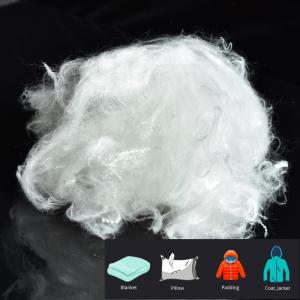
Add to Cart
Recycled Stuff Regenerated Polyester Staple Fiber White
2d*51mm White Non Siliconized Polyester Staple Fibers For Hot Air Non-Woven
1. Introduce
| Product Name | Polyester Fiberfill Bales(Unprocessed/processed) |
| Material | Recycled Polyester bottle flakes (sourced from blown-bottle level chips) IV-0.7~0.86 High resilience and toughness |
| Size | Add-silicon: 130*75*80+130*75*45 cm(200-300KG/Bale) NON-Silicon: 124*70*80+124*70*40 cm(200-300KG/Bale) |
| Color | White without fluorescence |
| MOQ | 1KG(New customers enjoy 0.5KG free sample) |
| Use | Bed, Seat, Chair, Car, Sofa, Quilt, Pillow, Plush Toy,filtration |
| Sample | Avaliable(20*14*3/100g) |
| Sample Fee | Sample Fee Will Return After Place The Bulk Order |
| Sample Time | 3-7 Days For Goods in Stock, 10-20 Working Days for Goods out of Stock |
| Packing | PP Packaging/Customized |
| Feature | No-Fluorescence,Soft, Durable, Popular ect, Hollow Conjugate, High Resilience, Super Fluffy-With GRS certificate |
Polyester materials such as PTA and EG are converted to gel polymer through polymerization performed at a high temperature and pressure.
After the spinning and drawing process, polymer becomes staple fibers when cut short into the form of cotton or filament yarns when made into the form of yarn.
2. Specification
|
The fabric we now know as polyester began its climb toward its current critical role in the contemporary economy in 1926 as Terylene, which was first synthesized by W.H. Carothers in the UK. Throughout the 1930s and 1940s, British scientists continued to develop better forms of ethylene fabric, and these efforts eventually garnered the interest of American investors and innovators.
Polyester fiber was originally developed for mass consumption by the DuPont Corporation, which also developed other popular synthetic fibers like nylon. During World War II, the Allied powers found themselves in increased need of fibers for parachutes and other war materiel, and after the war, DuPont and other American corporations found a new consumer market for their synthetic materials in the context of the postwar economic boom.
Initially, consumers were enthusiastic about the improved durability profile of polyester compared to natural fibers, and these benefits are still valid today. In recent decades, however, the harmful environmental impact of this synthetic fiber has come to light in great detail, and the consumer stance on polyester has changed significantly.
Nonetheless, polyester remains one of the most widely-produced fabrics in the world, and it’s hard to find consumer apparel that doesn’t contain at least some percentage of polyester fiber. Apparel that contains polyester, however, will melt in extreme heat, while most natural fibers char. Molten fibers can cause irreversible bodily damage.
3. More pictures

